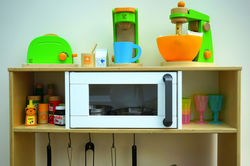


3.
Play Therapy
for
3 - 8 year olds
"Often play is the child’s symbolic language of self-expression and can reveal (a) what the child has experienced; (b) reactions to what was experienced; (c) feelings about what was experienced; (d) what the child wishes, wants, or needs; and (e) the child’s perception of self.”
- Dr. Gary Landreth
"Landreth (2002) has suggested that talk and cognitively orientated therapies are inappropriate for children through much of their development". "Over the past 30 years, a number of meta-analysis examining multiple play therapy studies have found play therapy to be effective with a wide range of problematic issues."
Richard Gaskill and Bruce D. Perry
Creative Arts and Play Therapy for Attachment Problems. Edited by Cathy A. Malchiodi and David A. Crenshaw.

Children's Play Therapy Services
Some areas where Play Therapy may help
Play Therapy aims for children to:
-
Become self-accepting (sometimes called self esteem)
-
Become confident and self-reliant (self-efficacy)
-
Become aware of their feelings and able to self-regulate their emotions.
-
Have the capacity to make appropriate choices and decisions
-
Have capacity for self-control and self-responsibility
-
Have opportunities to explore power, control and responsibility,
-
Have empathy for others
-
respect themselves and others
-
learn that their feelings are acceptable and foster positive expression
-
increase their vocabulary around feelings, thoughts and actions
-
learn to express their feelings appropriately, and gain control over intense feelings
-
learn to assume responsibility for themsevles
-
to communicate experiences that they may have had that they are unable to verbalise
-
encourages imagination, creativity and resourcefulness in confronting problems
-
learn self control and self direction
-
increases confidence and concentration abilities
-
learn to make choices an be responsible for their choices
-
learn about their environment
-
to learn from their mistakes in a safe and controlled environment
-
establish and build relationships
-
helps children when previous "talk therapy" was not a good fit
The therapist is the most important toy in the room!
A review of research on play therapy found that humanistic, non directive methods of play therapy are a particularly effective intervention for problems children experience (Bratton, Ray and Rhine, 2005 ) and these included:
-
ADD, ADHD, Autism - play therapy is highly effective adjunctive treatment for the emotional difficulties which can occur when a child has been accurately diagnosed with a neurological, biological or organic disorder (Cochran et al 2010:6).
-
Adjusting to family changes eg. family breakdown, parental conflict, separation, new siblings, blended families
-
Adjusting to migration
-
Aggression and acting out behaviours
-
Bonding and attachment
-
Bullying or being bullied
-
Encopresis and Enuresis
-
Foster, adoption and identity issues
-
Grief and Loss eg. death of someone close, divorce, death of a pet, rellocating home or school, absent parent, receiving a diagnosis
-
Hospitalisation, serious illness
-
Coping with a sibling who as special/high needs
-
Difficulty making friends, keeping friendships
-
Near death experience
-
Prenatal and birth trauma
-
School challenges
-
Social adjustment issues
-
Selective mutism
-
Separation anxiety
-
Sleeping and eating difficulties
-
Self concept and self esteem
-
Undure anger, aggressing, anxiety, fear, sadness, worry, shyness
-
Trauma - witnessing or experiencing family violence, witnessing a murder or robbery, witnessing or experiencing an accident, surviving a natural disaster, abuse eg. sexual, physical, psychological
-
Child-Centred Play Therapy
* 45 minute weekly sessions
* depending on age and needs of the child
Please note this is mid to long term therapy.
Sessions occur weekly.
-
Intensive Child-Centred Play Therapy 30 - 45 minute sessions
occurring twice a day or one per day across
10 days, or three times per week.
An appropriate immediate crisis response
-
Sibling Play Therapy
30 - 45 minute session per week,
with two siblings aged less than 24 months apart
-
Interplay Family Play Therapy
50 minute session per week
with one parent/primary carer and his/her/their child of any age
The primary focus is to understand one another, heal and strengthen the familial-attachment.
For further information please visit https://interplaytherapy.com.au/melbourne-office
-
Mobile Play Therapy
Unavailable at the moment.
-
Initial Parent Intake and Assessment Consultation
One 90 minute appointment required
-
Parenting Support and Review Consultation with Parent/s
30 or 60 minute session occurring regularly at least once every 6 sessions approximately
Once therapy commences, review consultations can be arranged. The purpose of these meetings is to review the young person’s personal development in relation to the therapeutic work and to provide consultation and, if needed, guidance to parents. Most parents/carers find these meetings very helpful in providing insight, information, skills, psycho education and empathetic support.
-
Closure Meeting and Closure Session
When a decision is made to end the therapy for whatever reason, a final closure meeting will be held with the parent AND child. The aim of this meeting is to help the child make an ending with their therapist and to make sure there are no ‘loose ends’.Potential referrals can be discussed if necessary.
Some of the Goals of Play Therapy
Reconstruction of activities
 |  |  |
|---|---|---|
 |  |  |
 |  |  |
 |  |  |
 |  |  |
 |  |
%20(236%20x%20194%20px)%20(224%20x%2087%20px).png)